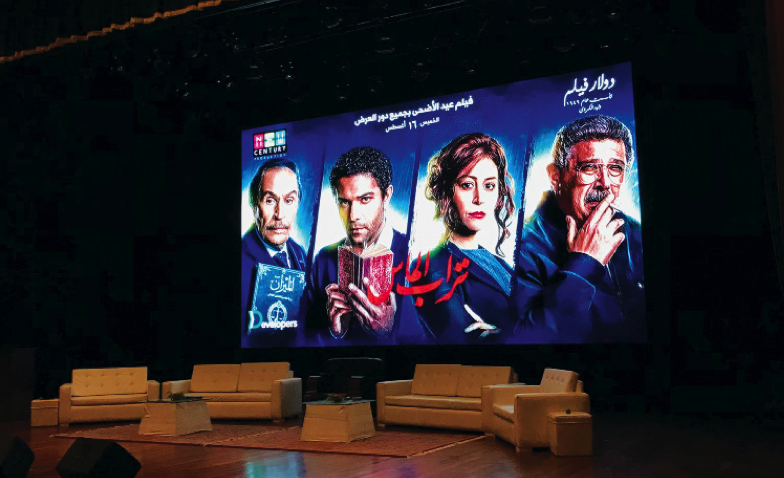When Politics and Poetry Merge: Ahmed Fouad Negm
By:Noran Alaa Morsi
@noranmorsi
Ahmed Fouad Negm, a poet active in the 1960s onwards, has had a legacy of revolutionary work that is still remembered today.
The poet, who died in 2013, was known for his unwavering criticism of presidents and authority figures in Egypt, in the form of poetry that was turned into song by his artistic partner, musician and composer Sheikh Imam.
The potency of Negm’s poetry between its semantics and relevancy both in Arabic and in translation has attracted Arab and non-Arab scholars to study his works.
Eliott Colla, a visiting associate professor in the Department of Arabic and Islamic Studies of Georgetown University, is one of them.
“The first time I heard any of this stuff was in audio cassettes that have been recorded, from recording to recording to recording. These audio recordings would be widely shared among activist groups,” Colla said.
During the lecture he recently gave at AUC, Colla emphasized that Negm’s poetry wasn’t widely distributed among the masses. Due to the fact that his works bluntly spoke out against injustices, they weren’t extremely popular with those who supported the government at the time. His work was mostly championed by university students and the like.
Negm often worked with Sheikh Imam, who played Oud and collaborated to create songs as a duo speaking out for those who opposed the successive regimes.
Colla explained that while Negm and Imam’s works were banned from state media for the majority of their careers, they would occasionally visit public universities for gatherings in the 1970s, in spite of the state security forces. He said that they were a fixture of the literary and poetry events organized by students at the time.
“These were not the songs that you hear on the radio, nor were Negm’s poetry collections widely published. Many of them, in fact, were first published in Beirut and Damascus, and only later in Cairo,” he added.
Yehia Abdelghany, Integrated Marketing Communication and Theater senior said that he looks up to Negm as one of his idols.
Earlier in 2019, Abdelghany and Political Science graduate Ahmad Mahana acted in a short video adaptation of Waraka Men Malaf El Kadeya, one of Negm’s revolutionary poems that depicts the scene of an interrogation of Negm by a state’s attorney.
“He means a lot to me for many reasons. There’s a big age difference between me and my parents. They went to university in the late 1970s, and they were very influenced by Negm’s poetry and Sheikh Imam’s songs,” Abdelghany said.
He explained that his parents passed their love for the duo onto his siblings, and for as long as he could remember, the songs were always playing at his house.
“Through their songs and poetry, I was exposed to events I didn’t live through, and a revolutionary movement that I never experienced,” he added.
History Professor Abdel Aziz Ezz El Arab is a self-proclaimed fan of the Negm and Imam duo and has been championing their work since he was a student.
Ezz El Arab recalled an instance from the past when he personally visited the room where the duo lived, whilst they were in prison. He met their roommate Artist Muhammad Ali and a number of Negm’s young disciples.
Among them was poet Saber Zarad who introduced him to Negm’s work and wrote down several of Negm’s poems in a notebook Ezz El Arab had carried with him to document the visit.
Ezz El Arab said the experience was life-changing for him as a student who thought of journalism as his life vocation.
“The result of the first time I saw their living conditions – the single small room where the three of them lived, I went home and it was the first time that I felt the sentiment of ‘we live in a big house’. I entered my bathroom and it consisted of the size of two or three of the rooms at their house,” Ezz El Arab said.
Experiencing this, their neighborhood and the way their space was an open point for gatherings led him to feel that he took everything for granted.
“I had thought that because I was critical in situations, that I spoke on behalf of the people. When in reality, I didn’t know the people at all. When I held up my pen and started to write, I felt very artificial, like I was writing something I did not experience,” he added.
What both Abdelghany and Ezz El Arab seemed to appreciate most about the duo is their open, sharp and satirical criticism of successive regimes and their refusal of all co-optation attempts.
“He shows who he is and doesn’t change himself unlike other poets. He doesn’t know how to sugarcoat the words, he’s very outspoken, bold. He’s very funny. That’s part of the reason why he spent most of his life in jail,” Abdelghany said.




